Industrial Rooftop Solar India
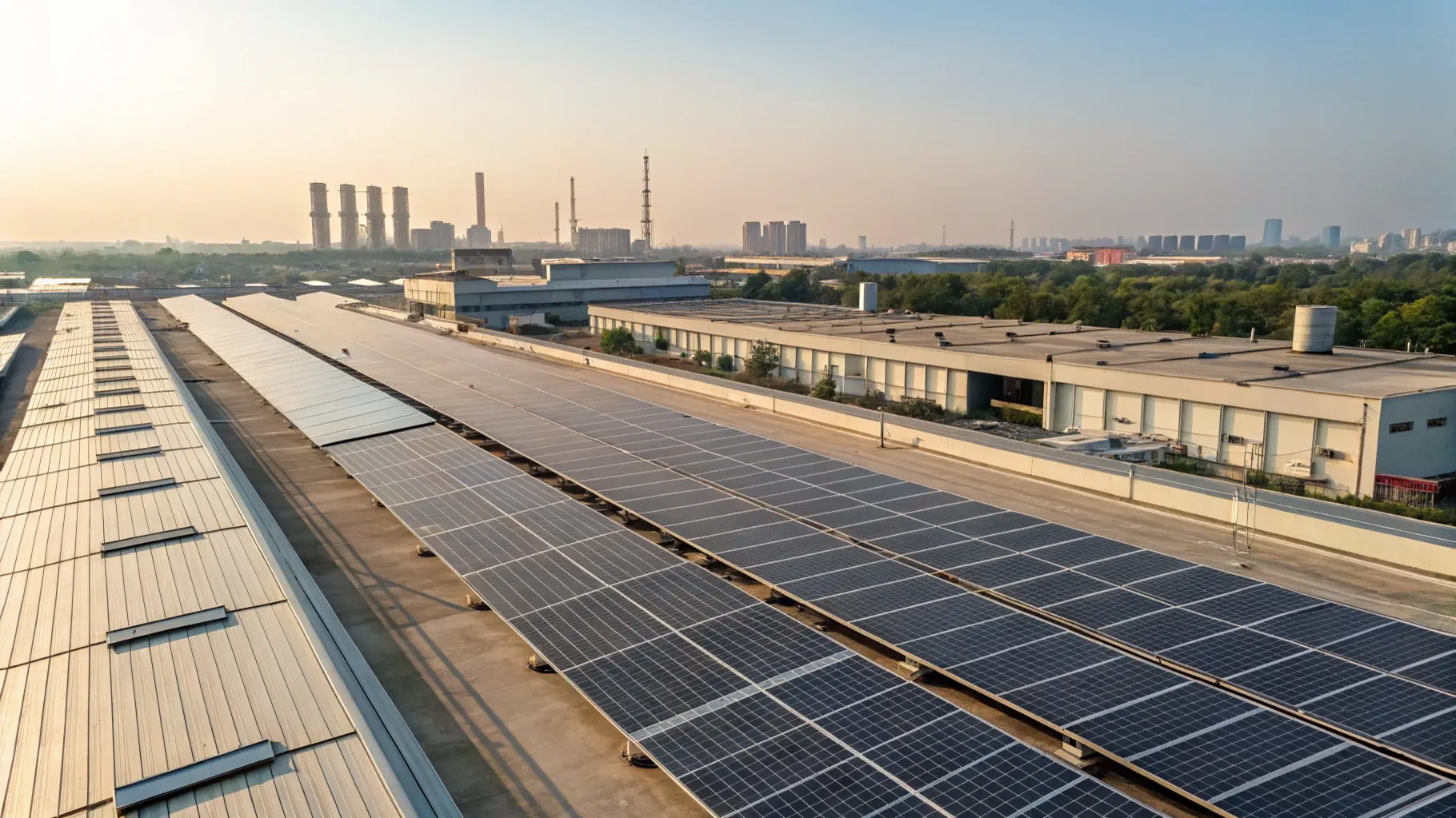
An industrial rooftop solar system is one of the most cost-effective ways for factories and large businesses to reduce their electricity expenses. By installing solar panels on unused rooftops of manufacturing plants, warehouses, and industrial sheds, companies can generate their own clean power, cut dependence on the grid, and lower operating costs.
In India, rising electricity tariffs and increasing sustainability demands are driving industries to adopt solar. At Synergy Solar, we provide end-to-end solutions for industrial rooftop solar projects, ensuring maximum energy savings, quick payback, and compliance with safety and policy standards.
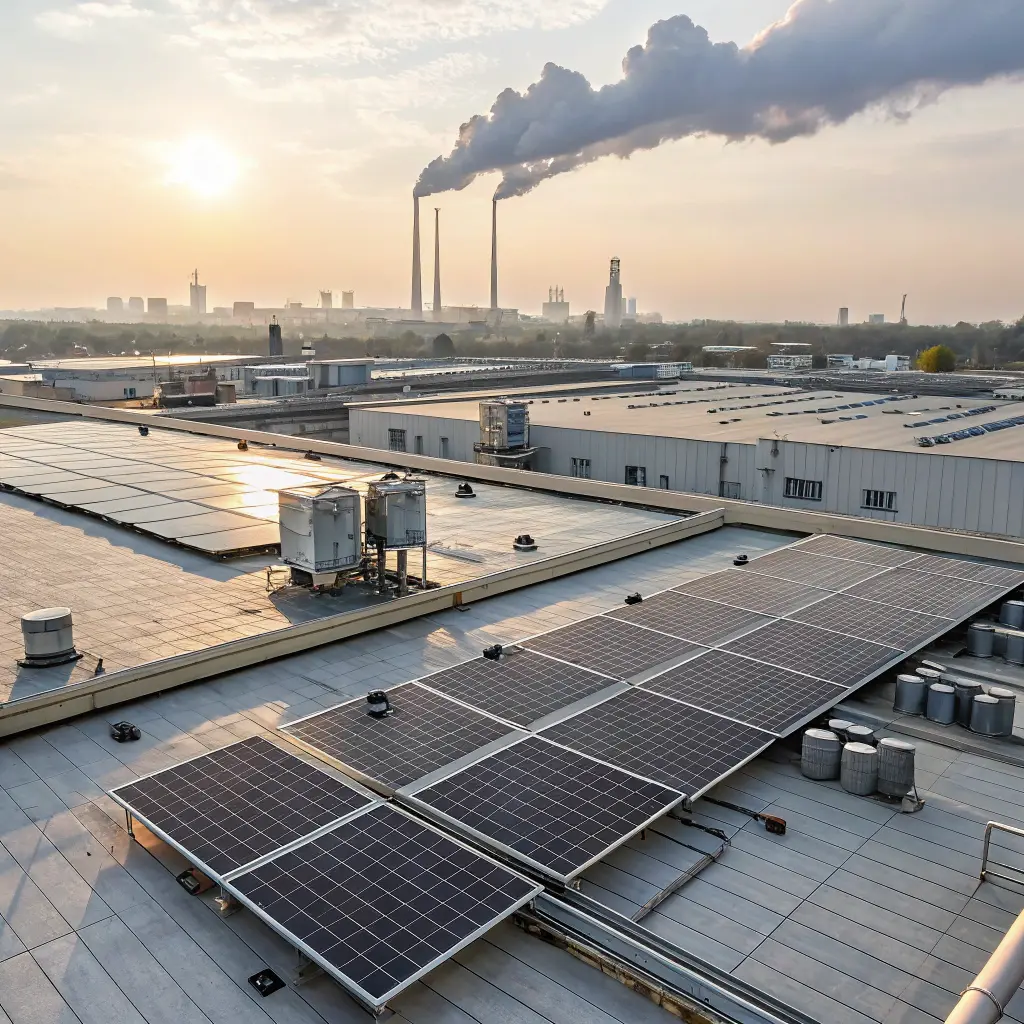
Why Industries Need Rooftop Solar
Industries are among the highest consumers of electricity, often paying premium tariffs. This leads to heavy monthly expenses that affect overall profitability. Switching to solar helps industries:
Save 40–60% on energy bills.
Reduce reliance on costly diesel generators.
Meet sustainability and CSR goals.
Ensure long-term energy security.
Protect against rising electricity prices.
Types of Industrial Rooftop Solar Systems
On-Grid Industrial Solar Systems
Most widely adopted. Connected directly to the grid, no batteries required. Ideal for large factories with stable grid supply.
Hybrid Industrial Solar Systems
Combine grid connection with batteries. Useful for industries like hospitals, pharma, or IT plants where backup is critical.
Off-Grid Industrial Solar Systems
Work independently with battery storage. Rarely used due to high cost, but suitable for remote plants without grid access.
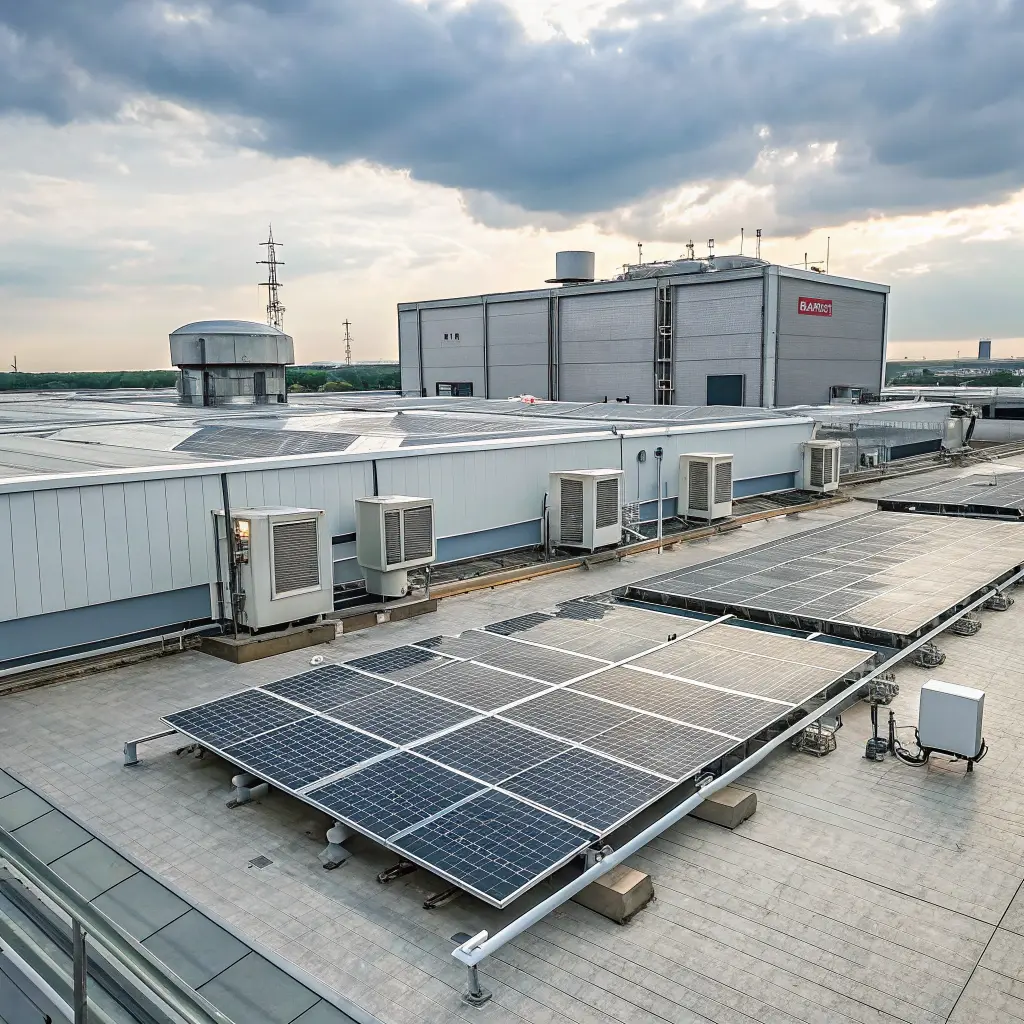
Industrial Rooftop Solar Applications
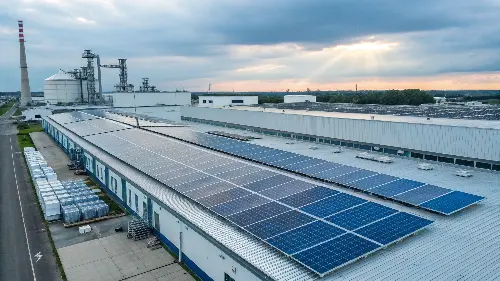
Factories and Manufacturing Units
In factories such as textile mills, chemical plants, automobile workshops, steel and cement plants, electricity is consumed by production lines, motors, compressors, and process equipment. An industrial rooftop solar system is connected to the plant’s main distribution board, where it offsets daytime grid consumption. This reduces monthly electricity bills, lowers diesel generator usage, and helps industries achieve 40–60% savings depending on load patterns.
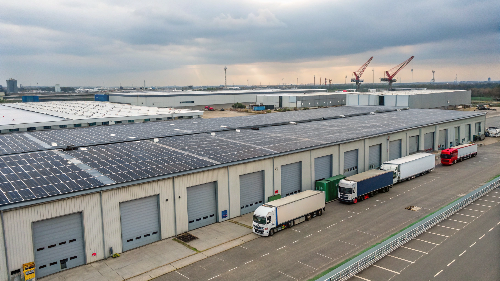
Warehouses and Logistics Hubs
Warehouses and logistics centers have large roof areas that make them ideal for solar panel installations. The solar power generated is fed into the building’s electrical system to reduce overall grid demand during the day. Typical loads that benefit from this offset include lighting systems, ventilation fans, conveyor belts, and charging stations for forklifts and equipment. By utilizing solar, warehouses can cut operating costs while improving sustainability in their supply chains.
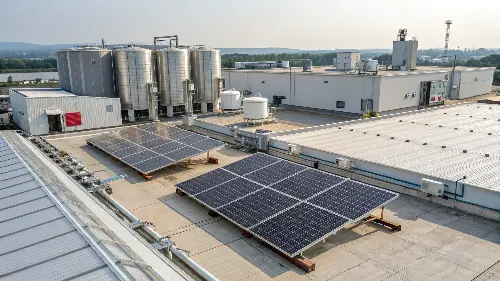
Food Processing & Cold Storage Units
Food processing and cold storage facilities run refrigeration and cooling equipment continuously, making them some of the most energy-intensive industries. Rooftop solar helps by offsetting a major part of daytime energy consumption, directly lowering bills. In hybrid setups, solar combined with batteries ensures that refrigeration and critical loads keep running even during power cuts. Over time, this reduces dependency on expensive diesel backup systems.
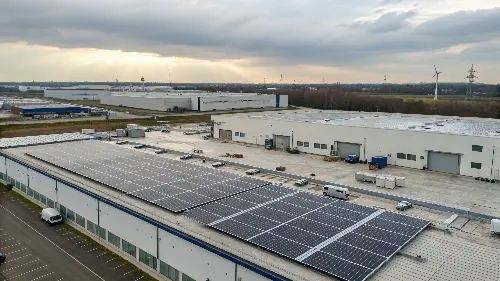
Industrial Parks & Export Zones
Industrial parks and export processing zones often host multiple factories and SMEs with high collective energy demand. By adopting shared rooftop solar or cluster-based solar installations, these parks can significantly reduce dependence on the grid and improve competitiveness. Solar offsets common power requirements such as administrative buildings, common utilities, and shared production facilities, while also helping tenants meet ESG and sustainability requirements demanded by global clients.
Industrial Rooftop Solar Price in India (2025)
The price of an industrial rooftop solar system in India is determined by factors such as system size, roof type, panel quality, inverter technology, and installation complexity. Larger systems benefit from lower cost per kW due to economies of scale, making solar especially attractive for factories, warehouses, and plants.
Average Price Range (2025)
- ₹35,000 – ₹50,000 per kW for large-scale industrial rooftop solar projects.
- Pricing reduces as system capacity increases (100 kW vs 1 MW).
Factors affecting price:
- Type of system (On-Grid, Hybrid, Off-Grid).
- Roof structure (RCC, metal shed, or elevated).
- Solar panel type (mono, poly, bifacial).
- Inverter type (string, central, hybrid).
- Installation complexity and safety standards.
ROI and Payback for Industrial Rooftop Solar
One of the biggest advantages of industrial rooftop solar systems is the high financial return on investment (ROI). Industries in India face high electricity tariffs, and switching to solar significantly reduces these costs while ensuring predictable energy expenses for the long term.
Annual ROI
- Most industrial solar projects deliver an ROI of 20–30% annually.
- This is far higher than traditional financial instruments such as fixed deposits or bonds.
Payback Period
- The average payback period is 3–5 years, depending on the system size, tariff rate, and usage pattern.
- Once the system is paid off, industries enjoy nearly free electricity for the next 20+ years.
Lifetime Savings
- Over 25 years, an industrial rooftop solar system can generate 5–10 times the initial investment in electricity savings.
- Larger systems deliver even greater cumulative savings, protecting industries against rising power tariffs.
Example – 500 kW Industrial Rooftop Solar
- Annual Generation: ~7,00,000 units
- Tariff (avg.): ₹7 per unit
- Annual Savings: ~₹50 lakhs
- Investment: ₹1.8 – ₹2.5 crore
- Payback Period: ~4 years
- Lifetime Savings (25 years): ₹10+ crore
Subsidy & Tax Benefits for Industries
Industries do not receive direct government subsidy for rooftop solar. However, they enjoy financial benefits such as:
- Accelerated Depreciation (40%) – Significant tax savings.
- Reduced GST rates on solar equipment.
- State-level renewable energy incentives.
- Lower operational costs through long-term energy savings.
Our Projects
Why Choose Synergy Solar for Industrial Rooftop Solar?
When investing in large-scale solar, industries need more than panels — they need a reliable partner who ensures savings, compliance, and long-term performance. Here’s why leading businesses trust Synergy Solar:
Proven Industrial Expertise
10+ years of experience in industrial rooftop solar projects across factories, warehouses, and industrial parks.
Customized Large-Scale Solutions
From 100 kW to multi-MW systems, tailored to your roof space, energy demand, and industry type.
Strong ROI Focus
Projects designed for 20–30% annual ROI, with a payback of just 3–5 years.
Sustainability Advantage
Helping industries meet ESG/CSR goals, reduce carbon footprint, and build a strong green brand image.
End-to-End Service
From site survey, design, and approvals to installation, monitoring, and AMC (Annual Maintenance Contracts).
Quality & Compliance
Use of MNRE-approved panels, inverters, and structures, with strict adherence to industrial safety standards.
With Synergy Solar, your industry gets more than an installer — you get a long-term energy partner dedicated to reducing costs and maximizing efficiency.
FAQs – Industrial Rooftop Solar in India
What is the price of industrial rooftop solar in India?
The average cost is ₹35,000–₹50,000 per kW in 2025. For example, a 1 MW system costs ₹3.5–4.8 crore.
How much roof space is required for an industrial rooftop solar system?
On average, 1 kW requires ~100 sq. ft.
- 100 kW → ~10,000 sq. ft.
- 500 kW → ~50,000 sq. ft.
- 1 MW → ~1,00,000 sq. ft.
What is the ROI and payback period for industrial solar?
Industrial solar delivers 20–30% ROI with a 3–5 year payback. After that, electricity is nearly free for 20+ years.
Can industrial rooftop solar power heavy machinery?
Yes. Properly sized systems can offset power for motors, compressors, chillers, HVAC systems, and production lines, reducing grid demand.
How is maintenance handled for industrial rooftop solar?
Maintenance includes panel cleaning, inverter health checks, and monitoring. Most industries choose AMC (Annual Maintenance Contracts) for long-term reliability.
How long does an industrial solar system last?
- Solar panels: 25–30 years.
- Inverters: 8–10 years.
- Batteries (if hybrid): 5–7 years.
Are subsidies available for industrial rooftop solar?
No direct subsidy is available for industries. However, businesses get Accelerated Depreciation (40%), GST benefits, and state-level incentives.
